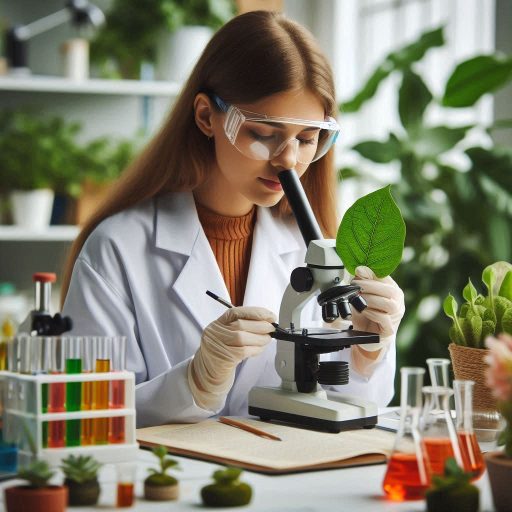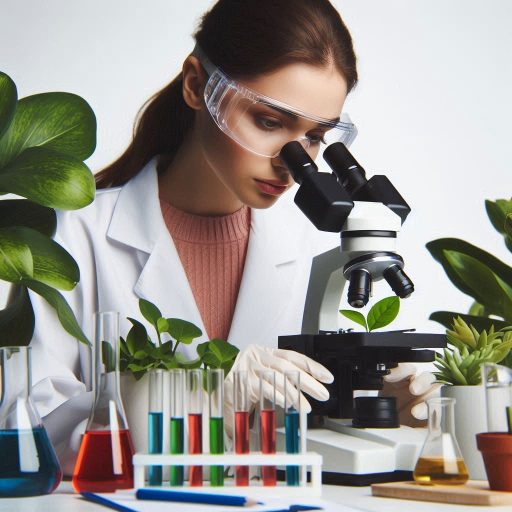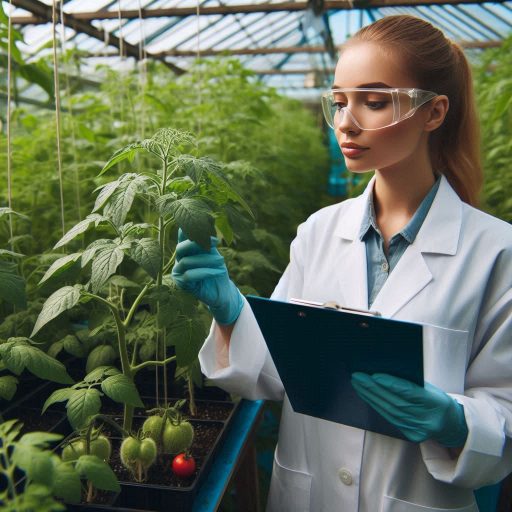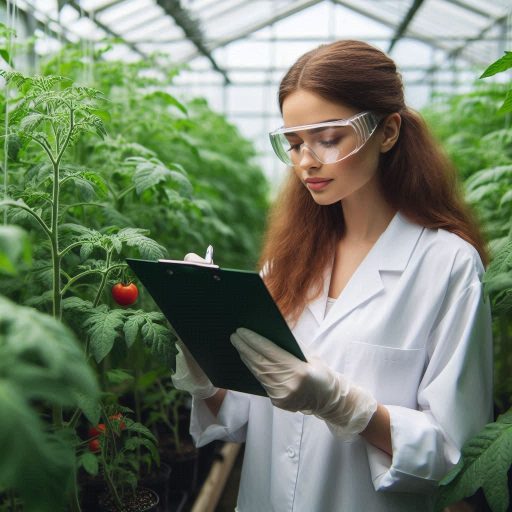Introduction
Plant scientists and botanists both play vital roles in understanding plant life and its significance.
Their work contributes to agriculture, ecology, and environmental sustainability.
While both fields focus on plants, the specific areas of study and application differ significantly.
Many people confuse plant scientists and botanists due to their overlapping interests.
Both professionals study plants, but their approaches and objectives vary.
This confusion can lead to misunderstandings about their respective roles and contributions to science.
Plant scientists primarily focus on applying knowledge to improve agricultural practices and crop production.
They often work in laboratories, conducting research to develop new plant varieties and sustainable farming methods.
In contrast, botanists specialize in the study of plant biology, taxonomy, and ecology.
They conduct field research to explore plant diversity and relationships within ecosystems.
In this blog post, we will highlight the key differences between plant scientists and botanists.
We will explore their unique responsibilities, educational paths, and the skills required for each role.
Understanding these distinctions will clarify their contributions to science and help aspiring students choose the right career path in the field of plant studies.
Education and Training
Plant Scientists: Education and Focus
Plant scientists typically hold degrees in agriculture, biology, or related fields.
Their education emphasizes practical applications of plant science.
They often study crop production, plant breeding, and environmental impacts on agriculture.
In plant science programs, students learn about soil management, pest control, and sustainable farming practices.
This knowledge prepares them for careers in agriculture, research, or policy-making.
Plant scientists focus on improving agricultural productivity and developing sustainable practices to address food security.
Many plant scientists engage in interdisciplinary research.
They work on projects that combine biology, ecology, and environmental science.
This diverse approach allows them to tackle complex agricultural challenges.
Botanists: Specialized Education
Botanists, on the other hand, usually hold degrees specifically in botany.
Their studies focus solely on plant biology and classification.
This specialization often involves understanding plant physiology, taxonomy, and ecology.
Botany programs delve deep into the anatomy and life cycles of plants.
Students study various plant species, their habitats, and their roles in ecosystems.
This knowledge equips botanists to conduct detailed research on plant diversity and conservation.
Botanists often conduct field studies, collecting samples and data from various ecosystems.
Their research contributes to our understanding of plant interactions within their environments.
They also play a critical role in conserving plant species and habitats.
Differences in Coursework
The coursework for plant scientists and botanists differs significantly.
Plant scientists take courses focused on agricultural practices, crop management, and environmental science.
Their curriculum emphasizes practical applications in farming and food production.
In contrast, botanists take courses centered around plant taxonomy, systematics, and physiology.
Their studies focus on the biological processes of plants rather than agricultural applications.
This distinction shapes their research interests and career paths.
Additionally, plant science programs may include courses on biotechnology and genetic engineering.
These subjects prepare plant scientists to utilize modern techniques in crop improvement.
In comparison, botanists may study plant genetics but with a focus on classification and evolutionary relationships.
The research focus for plant scientists and botanists also varies.
Plant scientists often engage in applied research to solve real-world agricultural problems.
They might study pest-resistant crops or innovative farming techniques.
Conversely, botanists tend to conduct theoretical research, exploring plant evolution and diversity.
They may investigate the relationships between different plant species or their adaptations to specific environments.
This research contributes to broader ecological knowledge and conservation efforts.
Both disciplines are essential for understanding and managing plant life.
Plant scientists drive agricultural innovations, while botanists enhance our understanding of plant biology.
Together, they contribute to a comprehensive understanding of the plant kingdom and its significance to our world.
Plant scientists and botanists have distinct educational paths and research focuses.
Plant scientists typically hold degrees in agriculture or biology, emphasizing practical applications.
Botanists possess specialized degrees in botany, concentrating on plant biology and classification.
Understanding these differences helps clarify the roles each plays in advancing plant science.
Both disciplines are vital for addressing agricultural challenges and conserving plant diversity.
Read: Profiles in Success: Leading Chemists of the 21st Century in the US
Scope of Work
Plant Scientists: Focus on Practical Applications
Plant scientists primarily focus on the practical applications of plant science.
They work to improve crops for better yield and sustainability.
These professionals aim to enhance agricultural practices through research and innovation.
In their research, plant scientists explore various aspects of plant growth.
They investigate factors that affect crop productivity, such as soil health, pests, and climate.
By understanding these factors, they develop strategies to optimize farming practices.
Plant scientists often collaborate with farmers and agricultural organizations.
They conduct field trials to test new varieties or farming methods.
This hands-on approach allows them to assess the effectiveness of their research in real-world conditions.
Additionally, plant scientists utilize biotechnology and genetic engineering.
They apply these technologies to develop disease-resistant or drought-tolerant crop varieties.
Such advancements contribute to food security by ensuring reliable harvests despite environmental challenges.
The focus on practical applications makes plant scientists vital in addressing global food demands.
Their work directly impacts agricultural productivity and sustainability.
By bridging the gap between research and farming, they play a crucial role in modern agriculture.
Botanists: Concentrating on Taxonomy, Ecology, and Evolution
Botanists, in contrast, concentrate on the taxonomy, ecology, and evolution of plants.
They study plant species, their classifications, and relationships within ecosystems.
This research helps enhance our understanding of plant biodiversity and conservation.
Taxonomy is a key area of focus for botanists.
They identify and classify new plant species, contributing to the scientific knowledge of flora.
Botanists conduct field surveys to document plant diversity and distribution in various habitats.
Ecological studies are also essential for botanists.
They investigate how plants interact with their environments and other organisms.
Understanding these relationships helps inform conservation efforts and ecosystem management.
Furthermore, botanists study plant evolution to trace the history of plant species.
They analyze genetic data and fossil records to understand how plants have adapted over time.
This knowledge is crucial for predicting how plants may respond to future environmental changes.
Varied Research Areas and Specialties Within Each Field
Both plant scientists and botanists have varied research areas and specialties.
Plant scientists may specialize in plant breeding, agroecology, or plant physiology.
Each of these specialties addresses different aspects of plant science with practical applications in agriculture.
Botanists also have diverse specialties, including ethno-botany, conservation biology, and plant pathology.
Ethno-botanists study the relationships between people and plants, focusing on traditional uses.
Conservation biologists work to protect endangered plant species and their habitats.
While both fields contribute significantly to our understanding of plants, their approaches differ.
Plant scientists apply their findings directly to improve agriculture, while botanists deepen our knowledge of plant biology.
Each field plays a unique role in advancing plant science and addressing environmental challenges.
The key differences between plant scientists and botanists lie in their focus and applications.
Plant scientists emphasize practical applications for agriculture, while botanists concentrate on taxonomy and ecology.
Both fields offer varied research areas and specialties, contributing to our understanding of plants and their importance in our world.
Together, they enhance our ability to address the challenges of food security and environmental conservation.
Understanding these differences helps clarify the essential roles each profession plays in the broader field of plant science.
Read: The Life and Times of a U.S. Physicist: A Day in Detail
Career Opportunities
Understanding Plant Scientists
Plant scientists focus on applying scientific principles to improve agriculture and industry practices.
They often work in various sectors, including agriculture, industry, and government agencies.
Their primary goal is to enhance plant growth, develop better crop varieties, and improve sustainability.
In agriculture, plant scientists conduct research to increase crop yields and resistance to diseases.
They develop new agricultural practices that benefit farmers and the environment.
Many plant scientists work for private companies, developing innovative products like fertilizers, pesticides, and genetically modified organisms (GMOs).
Government agencies employ plant scientists to address national food security and environmental challenges.
These professionals contribute to research programs that aim to improve agricultural policies and practices.
They often collaborate with farmers and industry stakeholders to implement research findings.
Overall, plant scientists have diverse career paths, with opportunities in research, product development, and policy-making.
Their work directly impacts food production, environmental conservation, and agricultural sustainability.
The Role of Botanists
In contrast, botanists primarily focus on studying plants in their natural environments.
They explore plant taxonomy, physiology, and ecology.
Botanists may work in academia, botanical gardens, or conservation organizations.
Academia offers botanists opportunities to teach and conduct research.
They educate students about plant biology and lead studies on plant diversity and evolution.
Botanical gardens provide settings for public education and conservation efforts.
Botanists in these environments often curate plant collections and conduct research on plant conservation.
Conservation organizations employ botanists to protect endangered plant species and restore habitats.
They study plant populations and ecosystems to inform conservation strategies.
Their work helps maintain biodiversity and address environmental issues caused by habitat loss and climate change.
Job Prospects and Career Paths
The job prospects for plant scientists and botanists differ significantly.
Plant scientists often find opportunities in the private sector, especially within agriculture-related companies.
The demand for food production and sustainable practices drives job growth in this field.
In contrast, botanists may face a more competitive job market.
Positions in academia and conservation organizations can be limited and highly sought after.
Many botanists pursue advanced degrees to improve their career prospects, which may extend their job search.
Despite these challenges, both professions offer fulfilling career paths.
Plant scientists can work on practical applications that benefit society and the environment.
Botanists contribute to our understanding of plant life and play critical roles in conservation efforts.
Plant scientists and botanists represent distinct yet essential fields within plant science.
Plant scientists primarily work in industry, agriculture, and government agencies, focusing on improving plant production and sustainability.
Botanists study plants in natural settings, often working in academia, botanical gardens, and conservation organizations.
While plant scientists enjoy a broader range of job opportunities, botanists play vital roles in education and conservation.
Both professions contribute to our understanding of plant biology and its importance to the environment and society.
Understanding these key differences can help aspiring professionals choose the right path in the plant science field.
Each profession offers unique opportunities to make meaningful contributions to our world.
Read: Salary Ranges: What to Expect as a Physicist in the USA

Research Methods
Plant Scientists: Focus on Experiments and Crop Improvement
Plant scientists primarily conduct experiments in controlled environments.
They work in laboratories or greenhouses to enhance crop yields.
Their research often involves developing new plant varieties that can withstand diseases or climate change.
By manipulating variables such as soil composition and light exposure, they gather valuable data.
These scientists utilize techniques like genetic modification and selective breeding.
They focus on traits that can improve productivity or nutritional value.
This method allows for rapid advancements in agricultural science.
Plant scientists aim to provide sustainable solutions to global food challenges.
Collaboration with agronomists, geneticists, and horticulturists enhances their research.
Together, they address complex agricultural problems, leading to innovative solutions.
Data collection methods in plant science often involve quantitative analyses and statistical modeling.
This approach ensures that findings are reliable and applicable in real-world settings.
Botanists: Studying Plant Diversity and Ecology
Botanists, on the other hand, conduct fieldwork to study plant diversity and ecology.
They explore various ecosystems to understand the relationships between plants and their environments.
Their research often involves collecting samples from different habitats for further analysis.
Field studies allow botanists to observe plants in their natural habitats.
They document species diversity, ecological interactions, and evolutionary relationships.
This observational approach provides insights into how plants adapt to changing conditions.
Botanists utilize a variety of methods for data collection.
They may use herbarium specimens, ecological surveys, and remote sensing technologies.
These methods help them gather information about plant distributions and populations.
By analyzing this data, they contribute to the understanding of plant conservation and biodiversity.
Unique Approaches to Research in Plant Science and Botany
The unique approaches to research and data collection distinguish plant scientists from botanists.
Plant scientists often rely on controlled experiments to test hypotheses.
They emphasize reproducibility and precision in their findings.
This approach is crucial for developing practical applications in agriculture.
In contrast, botanists prioritize observational research in natural settings.
They focus on understanding ecological dynamics and evolutionary processes.
Their work often emphasizes the importance of plant conservation and ecosystem health.
Both fields contribute significantly to the broader understanding of plant science.
Plant scientists drive innovations that enhance agricultural practices.
Botanists enrich our knowledge of plant diversity and ecological relationships.
Together, they provide a comprehensive view of the plant kingdom and its importance to our environment.
Plant scientists and botanists play distinct yet complementary roles in the study of plants.
Plant scientists focus on controlled experiments to improve crop yields and develop new varieties.
Botanists conduct fieldwork to explore plant diversity and ecological relationships.
Their unique approaches to research and data collection highlight the rich complexity of plant science and its vital role in sustainability and conservation.
Understanding these differences helps clarify the diverse career paths available in the field of plant science.
Read: Physics Specializations: Choosing Your Path in the U.S.
Contributions to Society
Plant Scientists: Ensuring Food Security and Sustainable Agriculture
Plant scientists play a crucial role in ensuring food security.
They focus on improving crop yields and developing resilient varieties.
By researching plant genetics and breeding methods, they enhance agricultural productivity.
Plant scientists study the effects of environmental factors on crops.
They investigate how plants respond to climate change, pests, and diseases.
This research helps develop strategies for sustainable agriculture practices.
Additionally, plant scientists work on improving soil health and nutrient management.
They explore innovative agricultural techniques, such as precision farming.
These methods optimize resource use and minimize environmental impacts.
Furthermore, plant scientists contribute to food safety and quality.
They research ways to reduce harmful substances in crops.
Their efforts ensure that food remains safe and nutritious for consumers.
Botanists: Conservation and Ecosystem Understanding
Botanists focus on the study and conservation of plant species.
They explore plant taxonomy, physiology, and ecology.
This research helps scientists understand plant diversity and its importance.
Botanists contribute to the conservation of threatened and endangered plant species.
They assess the status of various plants and develop conservation strategies.
By protecting plant biodiversity, they help maintain healthy ecosystems.
Moreover, botanists study the relationships between plants and their environments.
They examine how plants interact with animals, fungi, and microorganisms.
Understanding these relationships is crucial for ecosystem health and stability.
Botanists also engage in educational outreach.
They teach the public about plant diversity and its significance.
Their efforts raise awareness about conservation issues and the need for sustainable practices.
Impact on Society and the Environment
Both plant scientists and botanists significantly impact society and the environment.
Plant scientists directly influence food production and agricultural sustainability.
Their research supports farmers and ensures that communities have access to nutritious food.
Conversely, botanists contribute to preserving plant diversity and ecosystems.
Their work helps maintain the balance of natural habitats, benefiting all living organisms.
Healthy ecosystems provide essential services, such as clean air, water, and soil.
Together, these professionals address global challenges.
They tackle issues related to food security, climate change, and habitat loss.
Their combined efforts promote sustainable practices that benefit both people and the planet.
Additionally, collaboration between plant scientists and botanists can enhance research outcomes.
By working together, they can develop innovative solutions to pressing problems.
This interdisciplinary approach fosters a comprehensive understanding of plant science.
In essence, plant scientists and botanists play distinct yet complementary roles in society.
Plant scientists focus on food security and sustainable agriculture practices.
They work to enhance crop yields and improve agricultural practices.
Meanwhile, botanists concentrate on the conservation of plant species and understanding ecosystems.
They educate the public about plant diversity and its importance.
Together, their efforts significantly impact the environment and the well-being of society.
Understanding the differences between these two professions highlights their unique contributions to a sustainable future.
As we face global challenges, their work remains essential for a healthy planet.
Transform Your Career Today
Unlock a personalized career strategy that drives real results. Get tailored advice and a roadmap designed just for you.
Start NowYou Might Also Like: Networking Tips for Aspiring Soil Scientists
Collaborations and Interdisciplinary Work
Plant Scientists: Collaboration in Agriculture
Plant scientists play a crucial role in advancing agricultural practices.
They often work closely with agronomists to improve crop yield and quality.
These collaborations focus on developing sustainable farming techniques that enhance productivity while minimizing environmental impact.
In addition to agronomists, plant scientists frequently team up with geneticists.
This collaboration aims to understand plant genetics and develop improved varieties.
By working together, they can create crops that are resistant to diseases and pests.
Plant scientists also collaborate with engineers on agricultural projects.
These partnerships help design innovative technologies for precision farming.
They focus on optimizing irrigation systems, soil management, and data collection methods.
This interdisciplinary approach allows for comprehensive solutions to modern agricultural challenges.
Botanists: Collaboration in Conservation
On the other hand, botanists concentrate on the study and conservation of plant species.
They often collaborate with ecologists to understand plant ecosystems and their interactions.
This research helps identify how plants respond to environmental changes and threats.
Botanists also work with environmental scientists to address habitat destruction and climate change.
These collaborations aim to protect endangered plant species and restore ecosystems.
By combining expertise, they can develop effective conservation strategies.
In addition to ecologists and environmental scientists, botanists partner with conservationists.
These collaborations focus on protecting biodiversity and advocating for sustainable practices.
They work on projects that promote the conservation of native plant species and their habitats.
Importance of Interdisciplinary Collaboration
The importance of interdisciplinary collaboration in plant science and botany cannot be overstated.
Collaborations between plant scientists and agronomists lead to practical solutions for food production.
By integrating knowledge from different fields, they address pressing agricultural issues.
Similarly, partnerships between botanists and ecologists foster a deeper understanding of plant ecosystems.
These collaborations provide insights into the effects of climate change on plant species.
They enable researchers to develop adaptive strategies for conservation.
Interdisciplinary collaboration also enhances educational opportunities.
Students and researchers can learn from various fields, gaining diverse perspectives.
This exchange of knowledge enriches their understanding and fosters innovation.
Moreover, collaborative research often leads to more comprehensive solutions.
Combining expertise from different disciplines helps tackle complex challenges in plant science and conservation.
For instance, integrating genetic research with ecological studies can lead to the development of resilient plant varieties.
In summary, plant scientists and botanists have distinct roles in advancing our understanding of plants.
Plant scientists focus on agricultural improvements through collaboration with agronomists, geneticists, and engineers.
Botanists emphasize conservation, working with ecologists, environmental scientists, and conservationists.
The importance of interdisciplinary collaboration in both fields cannot be overstated.
By working together, they can address global challenges related to food security, environmental sustainability, and biodiversity.
This collaborative approach is essential for driving progress in plant science and botany, ultimately benefiting society and the planet.
Professional Organizations and Networking
Plant Scientists: Professional Affiliations and Roles
Plant scientists often focus on the application of plant biology in agriculture, environmental science, and biotechnology.
Many plant scientists join professional organizations to enhance their careers.
Membership in these organizations provides networking opportunities and access to valuable resources.
Organizations like the American Society of Agronomy (ASA) and the Crop Science Society of America (CSSA) are popular among plant scientists.
These organizations offer conferences, journals, and workshops that foster professional development.
Members gain insights into the latest research and advancements in plant science.
Being part of these organizations also allows plant scientists to connect with peers.
Networking can lead to collaborative research opportunities and job openings.
Additionally, professional organizations advocate for the interests of their members.
They promote funding for research and education in plant science.
The ASA and CSSA provide platforms for plant scientists to present their findings.
They encourage the sharing of knowledge and innovations that advance the field.
Membership in these organizations is beneficial for career growth and staying updated on industry trends.
Botanists: Membership and Specializations
Botanists focus on the scientific study of plants, including their biology, ecology, and evolution.
They also have access to various professional organizations that support their work.
Many botanists join the Botanical Society of America (BSA) or the Ecological Society of America (ESA).
The BSA offers resources for botanists to share research and promote plant studies.
They publish journals that highlight current research in botany.
Membership provides opportunities for botanists to connect with experts in their field.
Similarly, the ESA focuses on ecological research, including plant ecology.
Members participate in conferences and workshops that emphasize ecological issues.
This engagement helps botanists stay informed about environmental challenges and conservation efforts.
Botanists benefit from collaboration opportunities through these organizations.
They can work with other scientists to tackle pressing ecological problems.
Membership also fosters a sense of community among professionals in the field.
The Role of Professional Organizations in Supporting Careers
Professional organizations play a vital role in the careers of both plant scientists and botanists.
They provide platforms for education, collaboration, and advocacy.
Membership offers access to a wealth of resources that enhance professional development.
These organizations often offer scholarships and grants for research projects.
They support members in advancing their careers through funding opportunities.
By participating in conferences, members can present their work to a broader audience.
Additionally, professional organizations help shape policies related to plant science and ecology.
They advocate for funding and support for research initiatives that benefit society.
This advocacy ensures that plant scientists and botanists have the necessary resources to succeed.
Networking through these organizations fosters relationships that can lead to job opportunities.
Members can find mentors who provide guidance and support throughout their careers.
The sense of community established through these organizations enhances the overall experience for professionals in both fields.
In a nutshell, both plant scientists and botanists have distinct roles within the scientific community.
Their affiliations with professional organizations like the ASA, CSSA, BSA, and ESA enhance their careers.
These organizations provide essential resources, networking opportunities, and advocacy that support their work.
Whether focusing on agriculture or ecological studies, professionals in both fields benefit greatly from their memberships.
The collaboration and knowledge-sharing fostered by these organizations are crucial for advancing plant science and botany.
Conclusion
Plant scientists and botanists both study plants, but their focus areas differ significantly.
Plant scientists often emphasize applied research, addressing practical challenges in agriculture and environmental sustainability.
They work on improving crop yields, developing pest-resistant varieties, and enhancing food security.
In contrast, botanists primarily study plant biology, taxonomy, and ecology.
They explore plant classification, anatomy, and the relationships between plants and their environments.
Botanists may conduct research on plant species in natural habitats, contributing to conservation efforts.
Despite their differences, plant scientists and botanists play complementary roles in advancing plant science.
Plant scientists apply botanical knowledge to solve real-world problems, while botanists provide essential insights into plant diversity and ecology.
Together, they enhance our understanding of plants and their importance in ecosystems.
Both careers offer exciting opportunities for those passionate about plants.
Aspiring professionals should explore educational paths in plant science and botany to discover their interests.
Engaging in internships and research projects can provide valuable experience and insight into these fields.
Understanding the differences between plant scientists and botanists highlights the importance of both roles.
Explore these career paths to contribute to the vital field of plant science.




